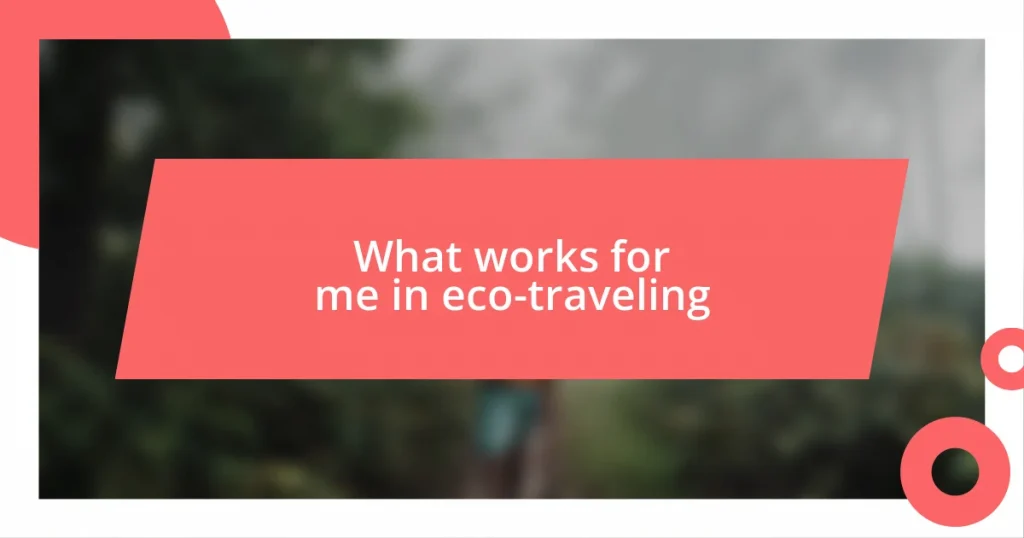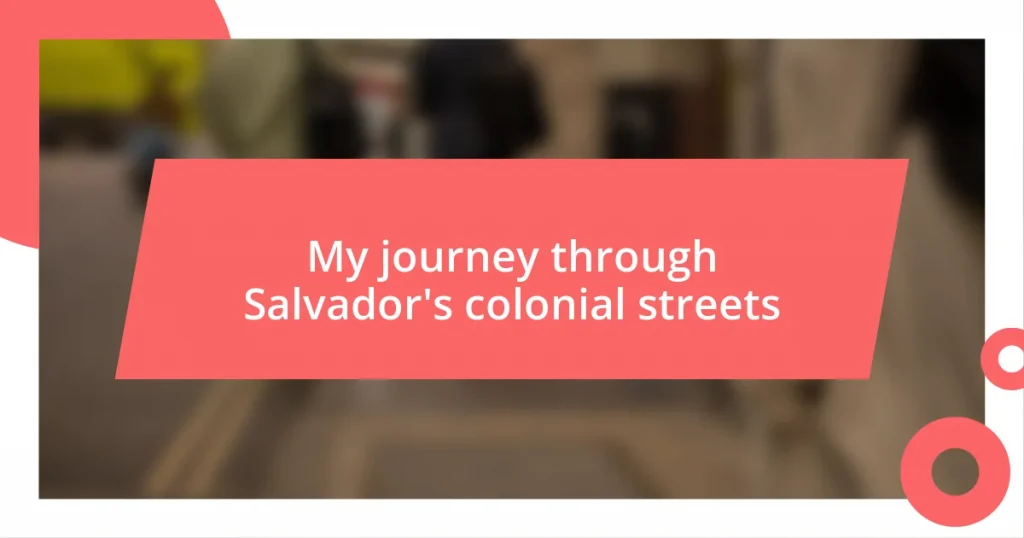Key takeaways:
- Eco-travel fosters a deep connection with nature and promotes authentic cultural experiences, fostering mutual appreciation between travelers and local communities.
- Choosing sustainable options like public transport, eco-friendly accommodations, and supporting local businesses significantly reduces environmental impact while enhancing travel experiences.
- Engaging with local communities and minimizing carbon footprints through mindful practices, like biking or volunteering, enriches travel and aligns with eco-conscious values.
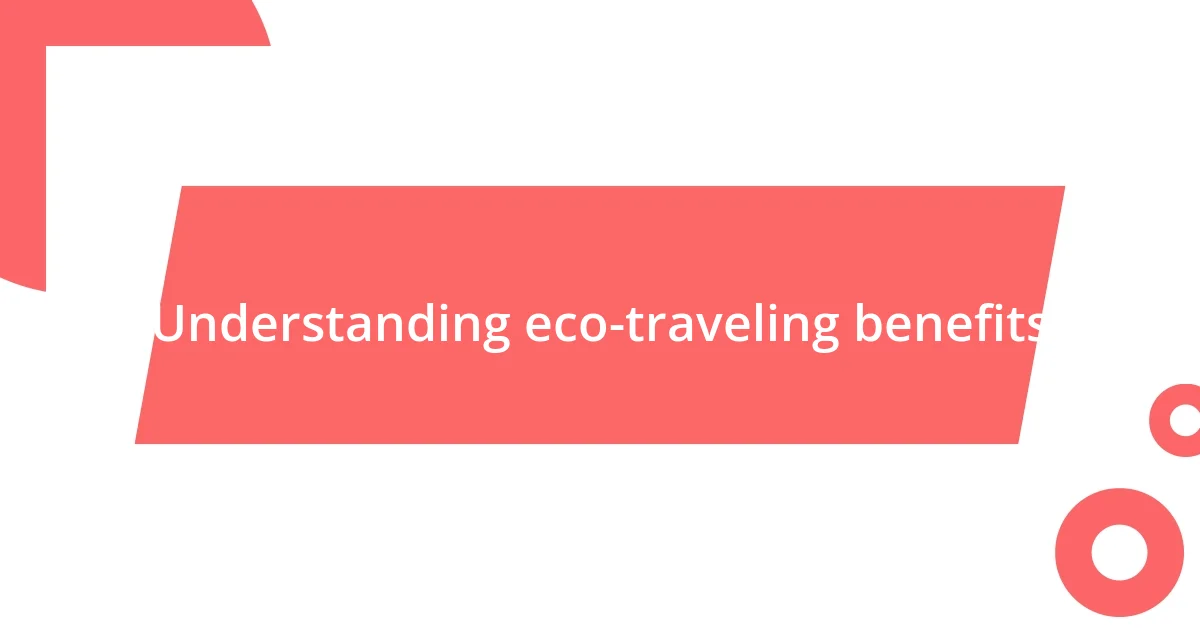
Understanding eco-traveling benefits
One of the most rewarding aspects of eco-traveling is the deep connection it fosters with nature. I remember hiking through a pristine forest in Costa Rica, where the chorus of birds and rustling leaves created a symphony that took my breath away. Can you recall a moment when you felt completely immersed in the beauty of the environment? It’s those moments that remind us why we should cherish and protect our planet.
Engaging in eco-travel also opens doors to authentic cultural experiences and community interactions. During my stay at an eco-lodge in the Amazon, I had the privilege of learning traditional fishing techniques from the local guides. That experience sparked a realization for me: how can we truly appreciate diverse cultures without understanding their relationship with the land? It’s not just travel; it’s a shared journey that benefits both the traveler and the local communities.
Another benefit of eco-traveling is its positive impact on our mental health. Personally, there’s something incredibly soothing about stepping away from the urban hustle and immersing myself in serene landscapes. Ever noticed how your worries fade when surrounded by nature’s tranquility? It’s like a mental reset, encouraging mindfulness and a renewed appreciation for life’s simple pleasures.
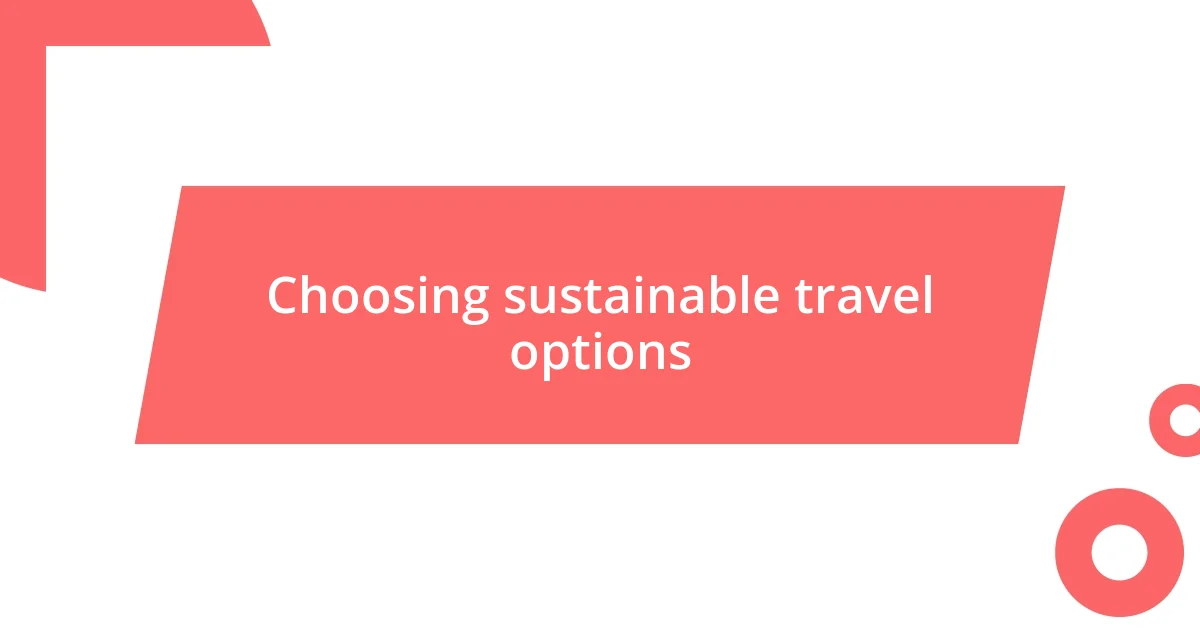
Choosing sustainable travel options
When selecting sustainable travel options, I find that being intentional about my choices makes a significant difference. For example, opting for trains or buses over flights not only reduces carbon emissions but also offers a unique perspective of the landscape as I travel. I once took a scenic train ride through the Swiss Alps, and the experience of watching the mountains unfold was mesmerizing, much more than any airplane could offer.
Here are some sustainable travel options I prioritize:
- Public Transport: Using buses and trains instead of rental cars or flights helps decrease my carbon footprint while allowing me to mingle with locals.
- Eco-Friendly Accommodations: I seek out hotels that follow sustainable practices, such as energy conservation and waste reduction. My stay at a green boutique hotel in Thailand was not only comfortable but also inspiring.
- Biking and Walking: Whenever I arrive at a new destination, I make it a point to explore on foot or by bike. This not only keeps me fit but also brings me closer to the local community.
- Local Food: I’m a firm believer in eating local. Not only does it reduce emissions from transportation, but enjoying regional cuisine also enriches my travel experience.
- Supporting Local Businesses: I focus on booking tours and experiences with local guides to ensure that my spending contributes directly to the community. One memorable tour led me to a family-run coffee farm, and I learned firsthand about sustainable farming practices while sharing a delightful cup of coffee.
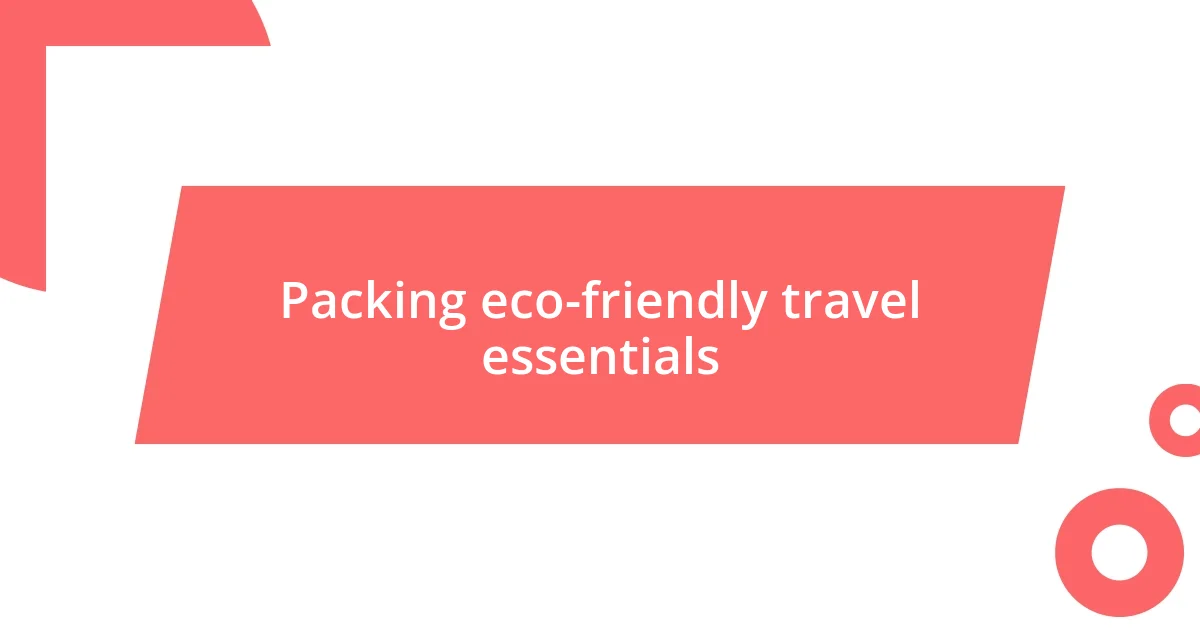
Packing eco-friendly travel essentials
Packing eco-friendly travel essentials is an opportunity to make a positive impact while exploring the world. I’ve discovered that using reusable items not only reduces waste but also adds a touch of convenience to my travels. For instance, I always carry a durable water bottle and a set of bamboo utensils; it’s astonishing how little things like these can make a difference in keeping our planet clean. Have you ever thought about how many single-use plastics we encounter on the road?
When it comes to personal care products, opting for biodegradable or refillable options is essential. I remember being thrilled to find eco-friendly shampoo bars and solid deodorants that fit seamlessly into my travel kit without the plastic waste. It’s like packing my values alongside my clothes! Plus, it’s a joy to introduce these products to fellow travelers—I’ve sparked great conversations over a simple bar of soap.
Lastly, packing light is not just about saving space; it embodies the spirit of eco-travel. I aim for versatile clothing that can be mixed and matched, reducing the need for multiple outfits. Each time I manage to fit everything into a carry-on, I feel a sense of accomplishment. It helps me focus on experiencing my destination rather than being weighed down by excess baggage!
| Eco-Friendly Essential | Benefits |
|---|---|
| Reusable Water Bottle | Reduces single-use plastics and keeps you hydrated. |
| Bamboo Utensils | Environmentally friendly and convenient for meals on the go. |
| Shampoo Bars | Biodegradable and lightweight, reduces plastic waste. |
| Versatile Clothing | Saves space and promotes minimalist packing. |

Finding responsible accommodations
When I look for responsible accommodations, I prioritize places that genuinely care about sustainability. For instance, I once stayed at an eco-resort in Costa Rica nestled in the rainforest, where the owners were passionate about preserving the local ecosystem. Their commitment to conservation extended beyond words; they had implemented solar panels and a rainwater collection system that made me feel like I was supporting a cause while enjoying my vacation.
It’s not just about the marketing claims; I dig deeper and research practices that align with my values. Have you ever considered how certain hotels source their food or manage waste? During a trip to Barcelona, I discovered a charming boutique hotel that composted its food scraps and sourced produce from local farmers. Knowing I was consuming meals that supported the community made my experience much richer.
I also pay attention to the overall impact of the accommodations on the surrounding area. A stay at a small lodge by a beautiful lake taught me the importance of responsible tourism. The lodge actively engaged in local initiatives, like beach clean-ups and wildlife conservation. I left not just with memories of stunning views but also with a sense of belonging to something bigger—a community striving for sustainability. When we choose where to stay, it shapes both our experiences and the world around us. Isn’t that a thought worth embracing?
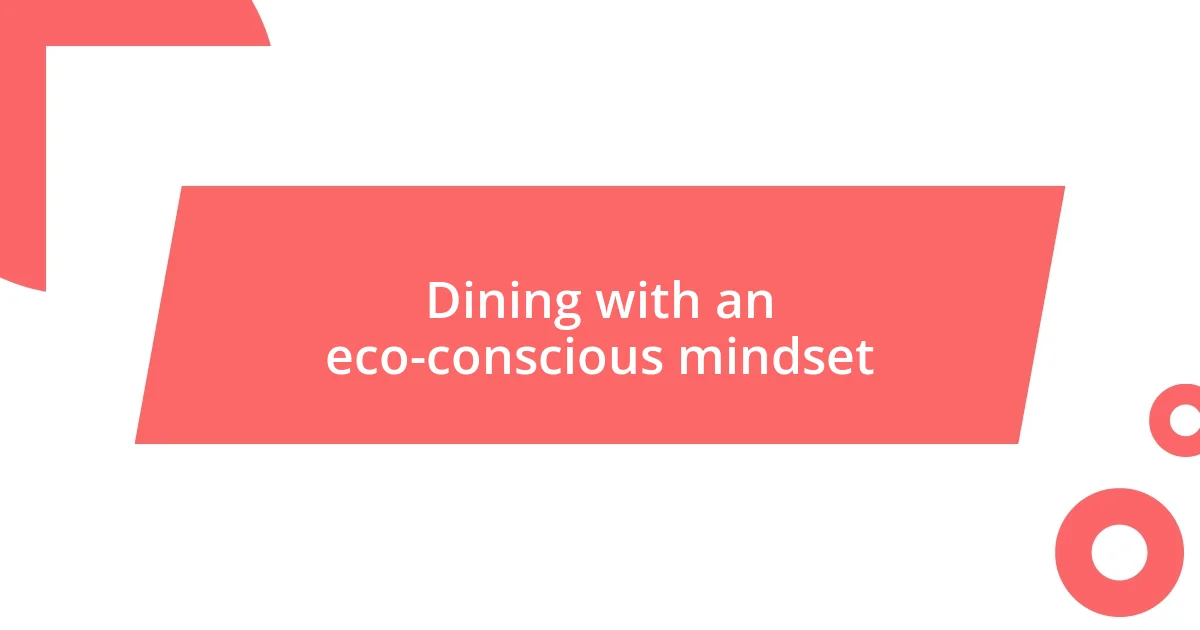
Dining with an eco-conscious mindset
When it comes to dining with an eco-conscious mindset, I find that choosing local and seasonal foods makes a world of difference. I vividly remember dining at a small farm-to-table restaurant in Tuscany, where every dish celebrated the region’s bounty. There’s something incredibly fulfilling about knowing that your meal not only supports local farmers but also comes packed with freshness and flavor. Have you ever tasted a tomato that was picked just hours before it landed on your plate?
Another key aspect is reducing food waste, and one of the most enjoyable strategies I’ve employed is ordering smaller plates to share with friends. During a trip in Thailand, I shared an array of delicious dishes with travel companions, allowing us to sample multiple flavors without overindulging. That experience not only created a communal atmosphere but also minimized leftovers, as we happily finished every morsel. Isn’t it nice to savor a meal while keeping sustainability in mind?
Lastly, I consciously select eateries that prioritize eco-friendly practices, like using compostable packaging and minimizing single-use plastics. I was thrilled to find a café in Bali that not only served delectable organic smoothies but also used bamboo straws instead of plastic. It’s thoughts like these that enrich my travel experiences, highlighting how dining can intertwine with environmental responsibility. How often do we consider the ripple effect of our dining choices on the environment? It’s more significant than many of us realize!

Engaging with local communities
Engaging with local communities is something that truly deepens my travel experiences. I remember visiting a small village in Kenya where I participated in a cultural exchange program. The warmth of the locals was palpable as they welcomed me into their homes, sharing stories and traditional meals that connected me to their way of life. Have you ever felt that unique bond that forms through shared experiences? It’s something I cherish.
In another instance, I volunteered in a community garden in New Orleans. Watching the joy on children’s faces as they dug their hands into the soil was incredibly rewarding. It made me realize that engaging with local communities isn’t just about visiting; it’s about giving back and contributing meaningfully. Have you ever participated in a local initiative while traveling? Those moments often become the highlights of my trips.
I’ve also discovered that supporting local artisans and businesses enriches my adventures. During a visit to Marrakech, I spent an afternoon with a craftsman who taught me the art of pottery. Not only did I leave with a beautiful piece to remind me of that experience, but I also supported a traditional craft that is part of the local culture. Isn’t it fascinating how a simple purchase can help preserve someone’s heritage? Engaging with local communities turns every journey into a shared story, and I wouldn’t have it any other way.
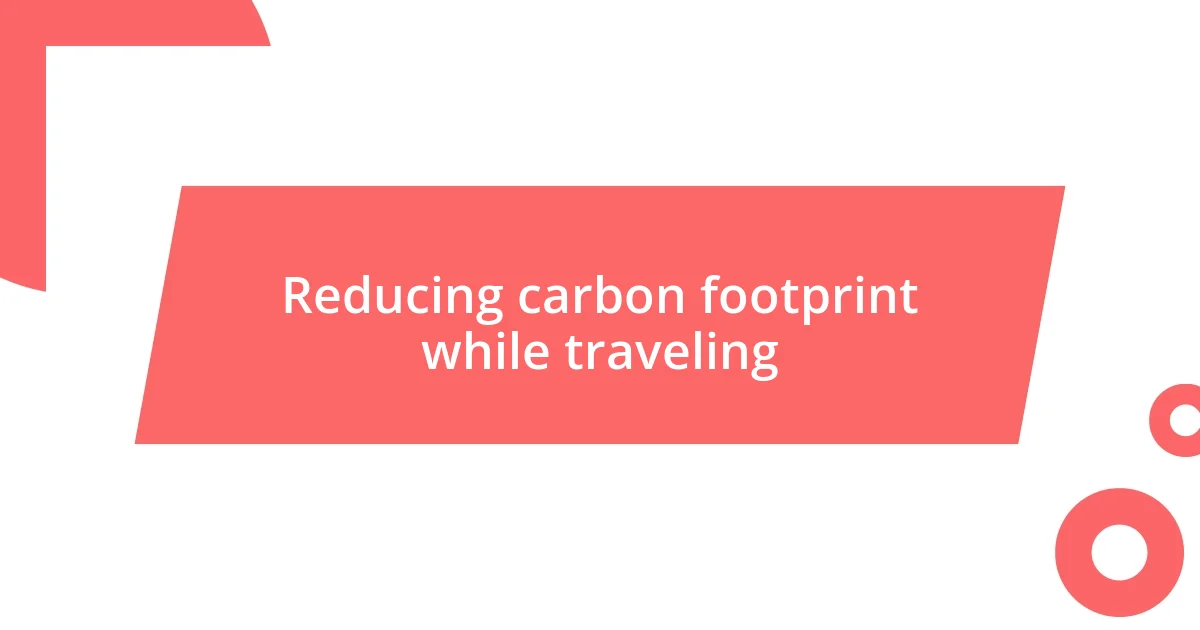
Reducing carbon footprint while traveling
Reducing my carbon footprint while traveling starts with the way I choose to get around. I’ve had memorable experiences swapping rideshares for biking, especially in Amsterdam. Pedaling through the city, I felt more connected to my surroundings, and the thrill of exploring hidden corners made me realize how refreshing it is to leave my carbon-heavy habits behind. Have you ever felt the joy of riding a bike instead of being stuck in a cramped bus? It’s a game-changer.
Accommodations also play a pivotal role in reducing emissions. I vividly recall staying in a small eco-lodge in Costa Rica that operated entirely on solar power. Watching the sunrise while sipping coffee brewed from locally sourced beans made each moment feel really special. It’s a reminder of how our choices can significantly impact the environment. Isn’t it empowering to know that by choosing sustainable lodging, you’re supporting practices that protect the planet?
Lastly, I actively seek out travel experiences that leave minimal traces. For instance, during a nature hike in Canada, I embraced the principles of “Leave No Trace,” making sure to respect wildlife and pack out what I packed in. It made me think: what legacy do we want to leave behind? Those simple actions show that eco-conscious traveling is not just a choice but a responsibility we all share.









